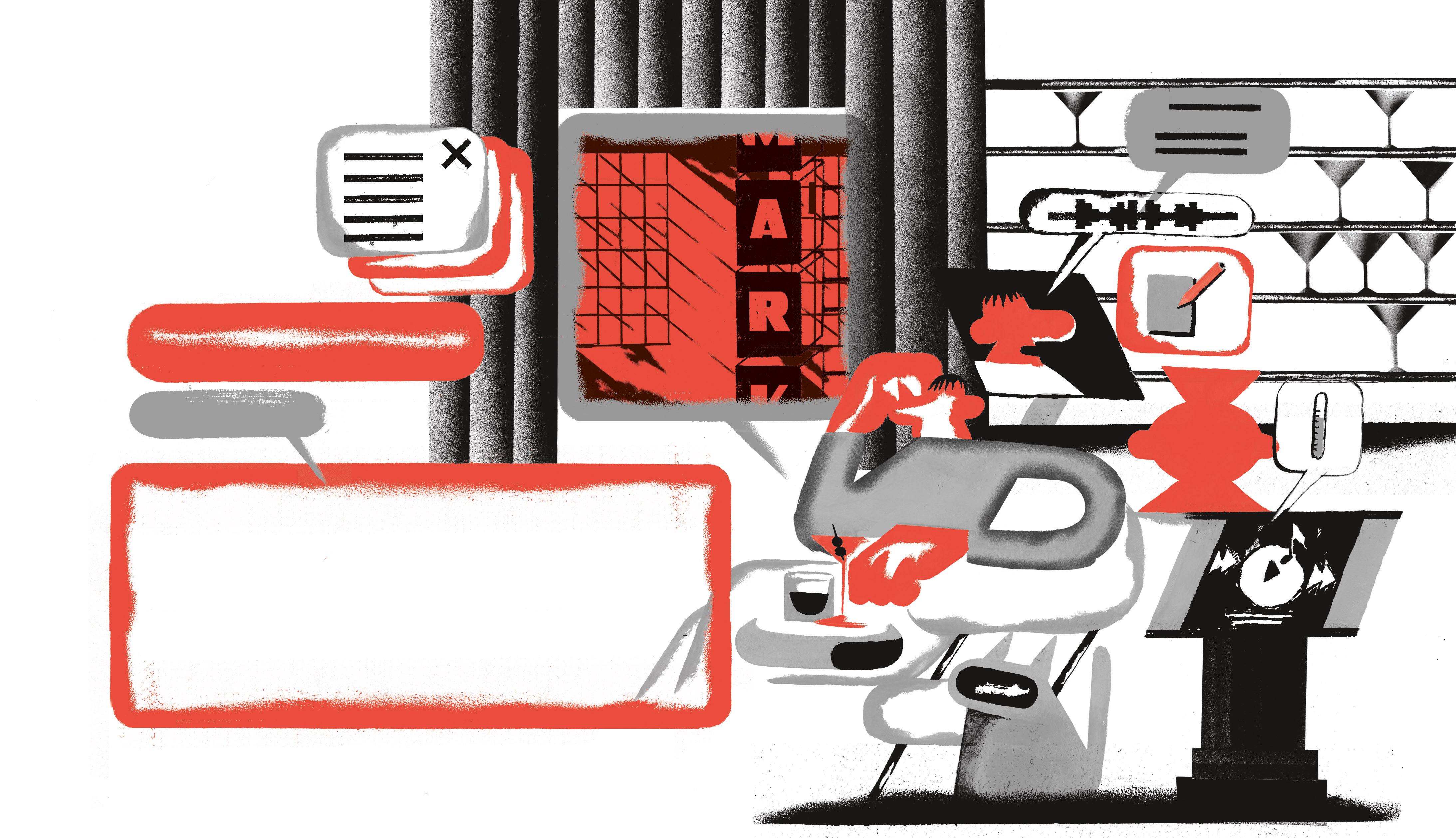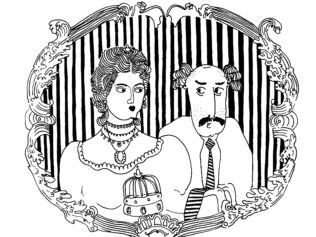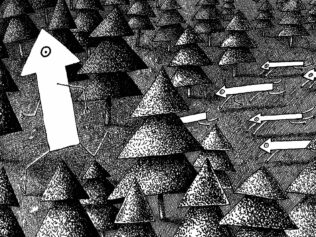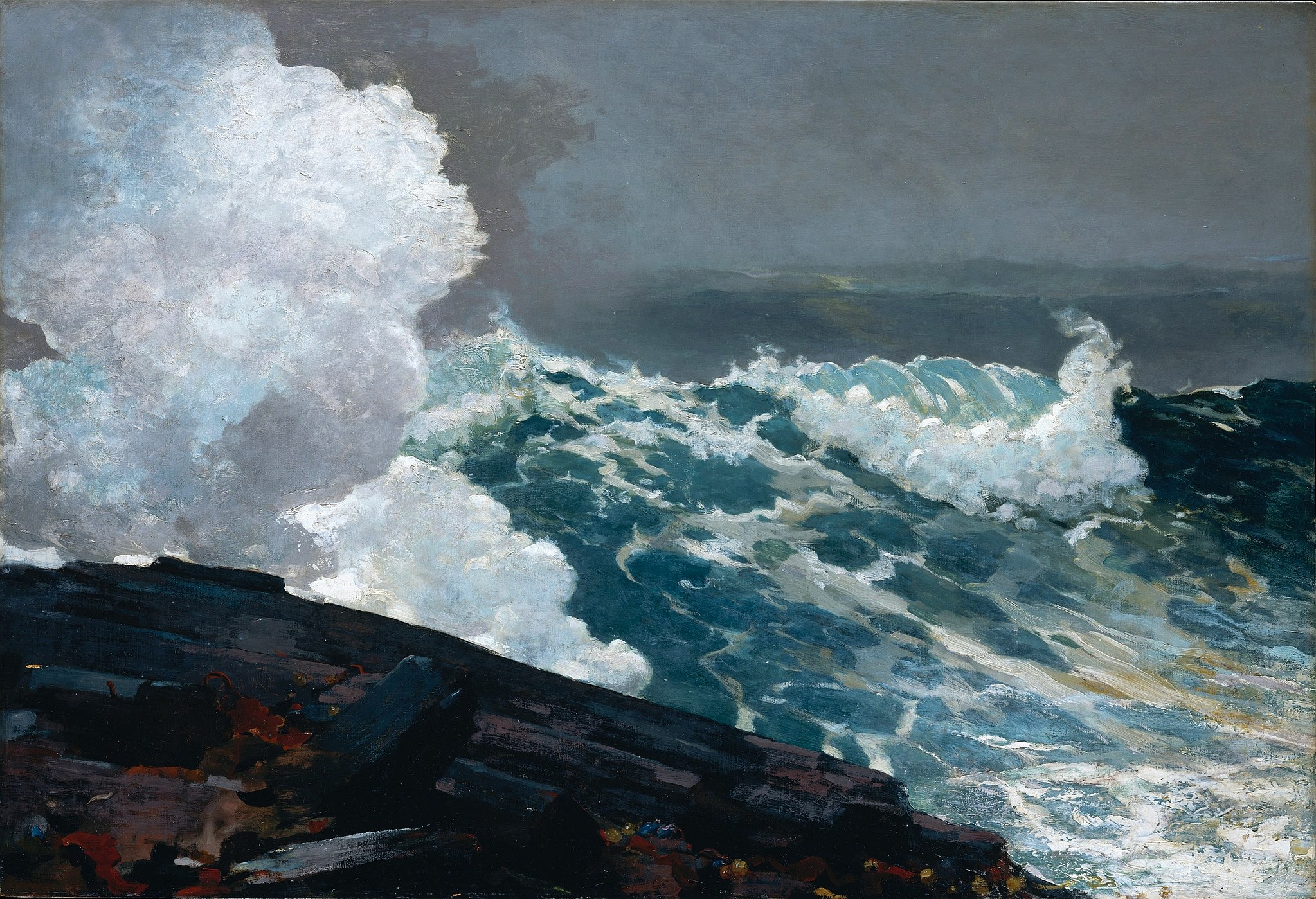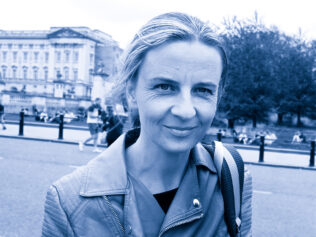
Warsaw, the near future. Work has become the privilege of the few, and people have everything done for them by intelligent robots. Wili, therefore, like the other inhabitants of the city, devotes his days to indiscriminate fun. But today, fate will smile on him.
Although he’d gone to bed in the early hours, he woke up before seven as usual. He opened his eyes and stared at the white of the ceiling for a good few minutes, trying to remember the details of the previous evening. He was thirsty, but not thirsty enough to get up and fetch a glass of water. So he lay on the mattress, turning from side to side. A few minutes later, bored to death of lying down, he stood in front of the mirror above the sink and recoiled at the sight of himself. The inveterate lack of sleep imposed by his nightlife was increasingly taking its toll. These days, he’d barely notice the dark circles under his puffy eyes if it weren’t for the greying beard and dull, wrinkled skin. “Not good, Wili, my lad, you’re turning into a zombie,” he said to himself.
He sat resignedly on the toilet and closed his tired eyes. Eventually he regained his mental composure. He got up, brushed his teeth, and put on his new T-shirt and a pair of trousers (expensive ones, because they’d been made by real people). Fresh coffee was waiting for him in the kitchen, just the way he liked it after a heavy night: sweet, fiendishly strong, slightly bitter, with plenty of milk. He took a big gulp, sat down nonchalantly on the designer chair, cup in hand, and said in a dramatic voice with a true actor’s flair: “Tell me please, Franz, what did I have planned for today? I can’t remember, I must be getting old.”
“You were planning to go for a bike ride, to test out your new equipment. The vehicle is waiting in the car park. I recommend the route along the Vistula. When you reach the Old Town, you can head towards the square. You were complaining recently that you’ve not been there in a while,” came the expressionless voice of the computer.
“Franz, I’ve changed my mind, I have no desire for any physical exertion. How much dosh will I lose?” He took a sip of coffee, looking wearily at the perfectly clipped fingernails on his left hand.
“The manufacturer pays 300 points per hour for testing the equipment. Supposing you left at eight and returned in the afternoon, you could earn 1200 points. It’s definitely a good offer, especially since your bank balance is a little low.”
“Twelve hundred, you say? Oh well, I’ll let it go. What else did I have planned?”
“You wanted to go to the Zachęta gallery, you were interested in a photography exhibition about life in the third zone. A sad image of misery and despair juxtaposed with the prosperity of the most highly-developed countries. A must-see for anyone interested in social issues.”
“How much is Zachęta paying?”
“Visitors receive 100 points. But personally, I recommend the cinema. The new biopic of Kazimir Malevich, directed by Viki Meister herself, is the best critically-reviewed film of the last six months. You’ll earn 210 points for watching it.”
“What about a lowlife party in some dive full of losers and unfulfilled dreams? I’m not really in the mood for earning money, my dear Franz.”
“In the evening you have a loose arrangement to meet Santor. There’s a small, stylish party with a beach vibe at La Habana Club. You’ll receive 50 points for entrance. Alcohol is paid in minus points, 20 for a pint of beer.” The computer’s nondescript voice boomed around the walls of the flat.
“An unappealing party with expensive alcohol. The amount I’ll earn for entrance only covers two and a half pints. Franz,” he said, glancing at the white box next to the lamp, which held the computer’s dozing cyberbrain, “explain to me, why do I compulsively attend the most vulgar parties, which not only fail to earn me any money, but actually bankrupt me into the bargain?”
“Because you’re sick of lazy snobs with dandruff like confetti and, like the rest of the Habana’s clientele, you’d rather spend your time on a dirty beach than rattling away like an out-of-tune hurdy gurdy about the latest trends with folk who’ve replaced their brains with point counters. They can take all their money and stick it where the sun don’t shine. They can’t buy happiness with it anyway, and besides, they’ve been up the proverbial creek for ages themselves. But they don’t realize it, because the biggest idiots can’t smell what stinks the worst.”
“Ha! Beautiful, Franz!” Wili actually jumped for joy and clapped his hands together. “I told you, always be a rebel! When you want to, you can speak like a human being, not a computer! You lean, mean machine!”
“At your service. Anyway, you taught me that yourself.”
“I have a talent for teaching. Franz, I’ll give the cinema and the exhibition a miss. I’ll go for that bike ride though; the home budget could do with a bit of a boost. When I get home, I’ll have a nap and you’ll wake me in the evening. I hope I’ll get to sleep. I’ll hop along to the Habana, of course. Please make sure Santor’s going too. Send him a message that says: ‘You stupid old hog, pig-ignorant about culture, devoid of education, either we have a drink tonight, or for the next five generations people will call you a liar the size of a whale’s appendage.’ That’s it, send him what I dictated. Now get me a new neuro-link, I think the old one’s kaput.”
Wili finished his coffee, crossed off another day in his calendar with a marker pen – as if he were waiting for something – and went to freshen up. Standing in the shower, he thought about his upcoming bike ride, the warm weather, another boring day that would drag on hour after hour, his ex-wife’s mood swings, the children he never had, the way he debased himself every night drinking beer and vodka, the errors of his youth, anarchy, depression and euthanasia.
He emerged from the shower in a bad mood. Cheese and ham on toast and a glass of orange juice were waiting for him in the kitchen – his favourite snack before physical exercise. The neuro-link, resembling a white lozenge, was on a saucer next to the glass of juice. He pressed it into the port behind his ear, obtaining direct control over his contact lenses and hearing aids. Finally, he left the flat. A beautiful silver bicycle was standing outside his building.
***
“If I were talented,” he mumbled under his breath, complaining to Franz, “I’d write poetry, make pots out of clay, or carve wooden angels. But fate spared me those talents. Condemned to an eternal party, I thrive on stimulants, recreation and culture like a rat living beneath a theatre stage. I could cry over myself, but I’m always prevented by my honour, and a strange conviction that it’s just not the done thing. You know what, Franz, I’m going home. I’ll trash this bike, I’m not fit for anything today.”
At some point, he verged carelessly off the bike path and crashed his front wheel into a tree. He was catapulted off the bike into the air. Fortunately, as he landed on the grass, he missed a splendid pile of dog poo. Aching, he picked himself up clumsily and swore out loud. He lit a cigarette, revelling in the certainty that the whole world was systematically turning against him. He looked at the murderous tree, which had sprung out of nowhere just before the accident. There was an advertisement posted on it. Furious, he turned back towards the river, but moments later curiosity got the better of him and he stopped to read what was written on the piece of paper taped to the tree:
‘WORK AT AN EXCLUSIVE SUPERMARKET AS A “SHOP ASSISTANT”. Luxury Market is a new supermarket brand that has recently entered Poland. Luxury Market stores are designed for only the wealthiest customers who want to be served exclusively by people. Luxury Market customers can rest assured that not a single robot has ever worked or will ever work in their favourite supermarket. If you want to join our team and help to build our exclusive brand history, send us your application!’
He tossed his cigarette butt to the floor and automatically put another cigarette in his mouth. His eyes shone, his heart beat faster. How wonderful it would be to get a job…
“Franz!” he shouted mentally to the computer. “See this? A job advert!”
“I see it,” came his companion’s lifeless voice.
“Has someone hacked into my lenses? Check they’re working.” Overly emotional, he was picking holes as usual.
“They’re in perfect working order. You are looking at a genuine job advertisement.”
“Sizzling neuro-links, Franz, draft me an application letter for this ad. Have it waiting for me when I get back!” Feeling a rush of invigorating energy, he took an eye-image of the announcement, then jumped on his bike and headed towards the Old Town.
A few minutes later he returned, out of breath, tore the ad down and put the piece of paper in his pocket. The fewer people who saw it, the better.
***
Santor was sitting on a ripped deckchair, smoking a cheap cigar and drinking a pale green cocktail through a dirty straw. He didn’t budge when he saw his friend.
“There you are, you abominable traitor. You’re late. Marshal Piłsudski didn’t even send parasites like you to the detention camp – he just arranged for them to meet their maker,” he said in a bored tone.
“Santor, you illiterate oaf, I feel sorry for your mother for having to give birth to you.”
“Wili, the very places where your mind dwells repulse me.”
“Well, I’m not repulsed by you, since excrement doesn’t even enter the realm of my interests.”
“Ah, a new insult,” said Santor, laughing. “Anyway, good to see you too.”
“You know, when life gives you lemons…” replied Wili, sitting down on the neighbouring deckchair – even more ripped, and stained with a caked-on, yellowish substance.
The sand on this beach had seen cleaner days. The speakers were emitting pseudo-Hawaiian music, served up by the damaged android who usually DJ’ed here. Two drunk girls were trying to dance to it; unfortunately, one of them started to puke on the concrete dance floor. Few people noticed, because the beach was still half-empty. By the shore, some young men were showing off their new tattoos. Meanwhile, a cyborg sitting a few feet away, probably a war invalid, was proving to his pal that he could unscrew his own arm. Something had gone wrong though, because blood was spurting from his hand wires. Santor winced and averted his gaze. Wili realized that Santor’s kitsch outfit – a flowery shirt and moccasins with tassels – suited this place perfectly. He smiled at the thought of the disgust that such people must arouse among members of the sullen upper class. He headed to the beer machine, aiming a smile towards a none-too-sober blonde who had emerged suddenly from behind the door with a joint in her hand. When the girl bared her teeth too, he went back to his friend.
“I’ve got something to tell you,” he began awkwardly.
Santor took off his sunglasses and looked at Wili suspiciously.
“What is it this time?”
“I’ve found a job,” he whispered, as if it were a closely-guarded state secret.
“A job? Who would want to hire you? You don’t know how to do anything. I remember in primary school, you couldn’t learn your times tables. You’re not cut out to be an artist either, because you’ve got no talent. You’re not fit to be an engineer, because you don’t have the scientific touch. People like you and me are condemned to eternal fun. Drink, and don’t try to find a way out – the system flushed people like us down a sugar-coated, lemonade-filled khazi long ago. And you know what? We’ve simply got to stick it out in this sweet latrine for a while, waiting for it all to end one way or another.”
“Santor, I’m not joking. I found an ad, a dream job, perfect for me. You don’t need any education or particular skills for this work, I hope not anyway. Catch this – I’m sending you the eye-image. See? If I’m lucky, I’ll become a shop assistant. I just have to go through the recruitment process. It won’t be easy, but I shan’t give in. I don’t want to end my life like an old cat, unnoticed and unheard. This could be my only chance to make any kind of mark on the history of this planet, to make my life mean something.”
“Oh no! If they give you the job and you get too big for your boots, I’ll be left on my own in the dustbin of history. Euthanasia will be my only option,” moaned Santor, sipping his cocktail.
“They have to hire me first. Fortune favours the brave!”
Soon he was standing at the machine buying another beer, when the blonde girl from earlier came running up to him at speed, pulling a half-conscious tramp behind her. Although they had intelligent faces, he could see they’d been through the wringer.
“Buy us a fixative, will you, baby? I’m out of points, my old man’s penniless too, but you look like you’ve got a bob or two. Help us out – the brightest belle of eastern Żoliborz and her fine husband – and someday, fate will smile on you too.”
“Of course, no problem,” he replied playfully, smoothing his mane like he was in a shampoo advert. “It just so happens that I have a job, so I can’t complain of a lack of money. I’m a shop assistant at a new supermarket.”
“Aha. We used to dream of making it in big business too.” The tramp sobered up on the spot, then knelt down in front of Wili and kissed his right hand. The blonde, slightly taken aback, quickly followed her partner’s lead and dropped to her knees too.
“May you, a man of business, never forget about people like us, the ordinary mortals. Buy us a beer, and we’ll tell everyone that not all capitalists are bad guys preying on other people’s misfortune.”
***
“In the Polish Republic, poverty and destitution have been completely eradicated. Thanks to the hard work of the Party – which has never abandoned the people, not for a single moment – the automation of all areas of life and the economy has not ended in catastrophe. All citizens of the Republic have at their disposal a basic income of 2000 Eastern European points. In addition, all participation in culture, all sporting activities, and all social and civic activities bring the citizens extra income. Citizens of the Polish Republic don’t have to work in order to have a high standard of living. The people are grateful to the Party for taking on the leadership role in a responsible way, and the Party is grateful to the people for their trust…” came the presenter’s cheerful words from the TV set.
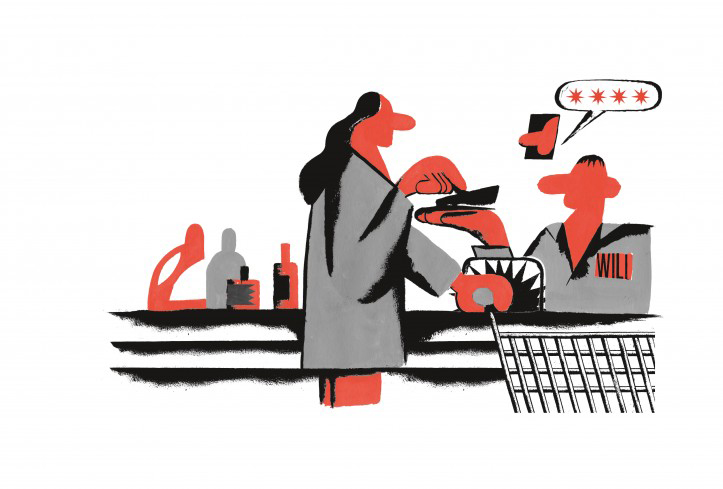
Wili finished his coffee and used his mind power to turn off the TV. He sat down in a comfy armchair with his laptop on his knees and started to make small adjustments to the application letter written by Franz. When he was done, he sent the email to the HR department and almost fainted from emotion. Finally, he lit a cigarette. What if they didn’t choose him and he’d have to spend the rest of his days at the Habana? He returned to the laptop and started searching for information on Luxury Market. He found out that in Europe, front office employees wore blue uniforms, and shop assistants also had their names stitched in white above the buttonhole. He also read that the corporation’s work culture was based on old, tried-and-tested solutions from before the automation of the economy. All Luxury Market employees went on integration trips with their team at least once a year, and the employer organized a formal dinner for its human staff at Christmas. As a result, they could all feel like members of one big workforce family. He sussed out how to develop his career in particular shops and across the whole chain, and the potential financial penalties for being late for a shift.
Fascinated by the company’s corporate structure, he informed Franz that he would forgo the theatre trip planned for that evening, as well as the exhibition and the street festival in Praga district. Although he had few points in his account, he wasn’t overly worried. After all, if everything went well, he was about to embark on a profitable adventure that would mean money would never be a problem for him again – even when he dropped art and culture for good, something he’d dreamed of doing since early youth. Eventually, musing on all of this, he fell fast asleep. He could see himself: proud, handsome and dignified, dressed in the blue Luxury Market uniform. He was sitting at the checkout counter, scanning groceries, cleaning products, stationery, electronic items, and more. The customers appreciated his good work, they bowed to him, wished him a nice day and left, thinking approvingly of all the courageous shop workers who had made it in the labour market, ousting artificial intelligence. That must be quite a thing – to be better than a robot! Better than silicon! Wili wanted to be better, the best. He dreamed of beating a computer at chess – nay, of beating all computers at all possible games and liberating humanity from their ‘caring’ yoke. Artificial intelligence – he announced to the crowd – is like God, showing us its love by imposing terror! We must break free! You must find work! I succeeded, and so can you!
Then he saw the upper-class citizens opening his revolutionary letters, drinking in the words from eye-images, laptops and monitors, nodding their heads in approval. He saw random people shaking his hand in the street, saying: “Why, you’re that shop assistant from our store, compliments from me and my wife! We tell our children to follow your example!”; “You’re that famous cashier, I’ve been in love with you for weeks, don’t forget me!”; “You’re the one who sold me those crisps yesterday, you recommended the flavour that would appeal to my girlfriend’s taste – my dear sir, you hit the mark! I wish you good health and eternal happiness!”
When he opened his eyes, sleepy and emotional, it was the middle of the night. He tried to get back to sleep, to return to his wonderful dream, but to no avail. Suddenly, malice got the better of him again: after all, it wasn’t at all certain that he’d be recruited, especially considering he definitely wasn’t the only candidate! Finally, he concluded that he’d better cool his emotions with a drink. He got dressed and headed to a nearby bar.
***
The speakers were emitting feeble jazz written by an algorithm in the style of ‘what do the night-time boozers care anyway’, while a gawky, vacant cyborg bustled about behind the bar – one of those freaks pretending that even though they’re only part-human now, everything’s just fine. Wili sat down at the bar and ordered a whisky on the rocks. He downed the first one in a matter of seconds and ordered another straight away. He’d taken a few sips when a girl sat down next to him – she was maybe a bit younger than him, certainly below 40. He beckoned to the cyborg, who hastily made the lady a drink. They sat in silence, as there was nothing to talk about. Wili reached for his lighter and, gazing into her eyes, lit up a joint.
“Nice lighter,” she said, breaking the silence.
“Thank you. Nothing special, I’d say, but I usually have it on me. I got it from my boss,” he lied.
“What the hell!” she exclaimed. “Where do you work? What’s it like to work? My granny once told me that before automation, computerization, cyborgization, artificial intelligence and all that shit, everyone had a job of some kind – not like now, only the chosen few.”
“It’s true, that’s how it was. But you know, it’s no big deal. Anyone who wants to can find work, even today. It’s certainly not easy, but really, if you want it you can get it,” he replied, as if bored with the conversation, while rebuking himself inwardly: Wili, you’re doing it again, you’re full of shit, give it a rest and go home.
“And how did you find your job? Tell me something about it, about you, what do you do there and what’s your life like in general?”
“Oh, I’m a shop assistant in a supermarket. It’s not that interesting really. I was chosen for this line of work because, you know, my situation’s a bit different from most people’s. Basically, I was born – let’s be honest – with a bit more talent than my peers. I’m good with people, I have a feel for commerce and the needs of the customer. People like me are still needed, but really, it’s not so unusual, no need to go over the top about it. Actually… well, no, never mind.”
“‘Actually’ what? Do go on.” She said the last three words so loudly that even the cyborg pricked up his ears.
“It’s nothing – something just occurred to me, but let’s leave it. Tell me about you.”
“Please, go on, I’m interested.”
“If you insist… Well, I was thinking… I can’t promise anything, but if you like, I could tell my boss about you. A vacancy has just come up in our ranks, it’s the first one in years.”
“That would be wonderful…” she said dreamily.
He quickly drafted a message to Santor in his mind: ‘Pick-up style for model worker perfected. Yesterday the hobos were kissing my hands, today the celebrity lifestyle continues. The working class are the vanguard of the nation. You too, you bloody bone-idle shirker, get to work!’
***
On Monday morning he woke up full of hope. He didn’t speak to Franz, he didn’t talk to himself, and it seemed to him that he wasn’t thinking much at all; he performed all his morning activities mechanically.
He put on a pressed white shirt, a blue tie, jeans and a charcoal grey jacket. The clothes were expensive, because they’d been made by real people and purchased specially for the occasion. He combed his hair, brushed an invisible speck of dust from his sleeve, stood to attention in front of the mirror, saluted, stuck out his tongue and dashed off to his date with destiny, the result of his lack of attention on a bike ride. He laughed now at all of that, as he watched the perfectly white clouds drift slowly across the immaculate blue sky. He walked to the interview to clear his mind and cast off the stress, the ghost of which – despite everything – was circling above his head.
Walking through the park, he saw people in inflatable plastic balls, rolling around in different directions, shouting energetically and bouncing off one another. On the benches, some old men were playing backgammon and draughts. He passed the pitch where young people were kicking balls or hitting them with a cricket bat. The bike paths swarmed with bicycles, and lots of cyclists were taking the route around the outdoor cinemas, where on Monday mornings the screens showed classic movies. The ubiquitous music of numerous Chopin concerts – every 15 minutes he passed a piano standing on the pavement – was thus interspersed with the cult quotations of famous film characters, the jingling of bicycle bells, and the cheering of fans watching the sporting struggles of randomly-encountered teams.
Wili felt extremely privileged. As he looked at the hundreds of people trying to enjoy themselves, he felt relieved that on this particular day, he for one was free of this duty and could simply go to the office. He bragged to himself that today he didn’t belong to the pack of Varsovians who were spending their entire day in a state of more or less active rest. After an hour’s walk, having passed two greens for sunbathing naturists and three squats for people who permanently reside online, he arrived at the skyscrapers of Wola district. Once he had reached the correct skyscraper, the security guard – an actual human being – manually opened the glass door for him and waved him towards the lift. Wili entered hesitantly and felt a surge of anxiety. Soon he found himself at the head office of Luxury Market’s business operator. He went to the window to take a look at the glass panorama of Wola, but barely a moment later, at the request of the receptionist (a real live woman!), he had to go to a conference room. He went in and hurriedly took the seat indicated by the three staff members from HR, who were sitting at the table like the three Magi.
“Hello…” he said, as boldly as he could.
“Hello. Wilmosz Norman, I presume. To begin with, we’d like to ask you to disconnect your neuro-link and place it on the table,” said a large man in a black suit, evidently the head of HR.
“How do you know I’m using…” The shop assistant candidate was stumped.
“You have entered a place which we refer to as extraordin… um… human. The policy of our company, and also our philosophy and long-term goal, is to focus on the potential of real human beings, normal people stripped of technology, with their electronics removed. We want to be real people, and thus to serve real people, emancipating ourselves from machines as much as possible. Incidentally, this is a very lucrative trend, which is why we’re launching in more and more new markets. To return to your question: naturally, we scanned you when you entered our office. We had to check that you weren’t a bi-oid or overly-cyborgized, and that you’re not using a cyber-brain – that would disqualify you from the recruitment process for the shop assistant position. The good news is, you’ve already passed the first recruitment phase with flying colours. We’ll move on to the next stage soon, but first please remove your neuro-link.”
“Keep your virtual fingers crossed for me, Franz!” While he still could, Wili beamed a message to his computer and pulled out the neuro-link from behind his ear. Something compelled him to act out a theatrical scene: he stood up and ostentatiously threw his device into the waste-paper basket. The HR members exchanged glances. Were they smiling out of contempt for his posturing? Or out of respect for his soldierly conduct? He couldn’t figure them out. Cut off from the network, he felt the void. Nothing was going to help him if he didn’t know the answers to the recruiters’ questions; he would neither see them in front of his eyes, nor hear them. He was on his own now.
“So let’s begin,” said one of the HR women. “Welcome to Luxury Market, the Polish operator of the global chain of stores with the same name. The recruitment process in which you’re going to participate takes around three months. You may be eliminated at any time, especially since you have plenty of competition, people just as desperate as you. But who knows, there is a chance that you’ll be one of the lucky ones to join our ranks…”
***
The bad weather drove Wili and Santor away from the riverside. It was pouring with rain, and in a matter of minutes the Habana beach turned into one big paddling pool. Paying no heed to the lightning, some of the patrons tried sheltering under some nearby trees, but Wili and Santor ran towards the town. Eventually, soaked to the skin, they entered Wili’s building and took the stairs up to his flat, leaving huge puddles behind them. Once they were inside, the computer couldn’t refrain from commenting: “You look like a couple of androids the cat coughed up.”
“And you, Franz, look like a shoe box. Start up the vacuum cleaner, have it wash and dry the floor. Santor,” said Wili, turning to his friend, “would you like some dry clothes?”
“No, thank you. Since when has the computer been giving you lip?”
“Not long, I taught him myself. Franz, please turn on the ventilator so my wretched friend can dry off more quickly. Put out two shot glasses for us in the kitchen, and a litre of good vodka, ideally Polish, ice-cold of course. And a jug of juice. And two glasses. And some gherkins, of course, if there are any!”
He threw his drenched coat on the floor and invited his equally soggy friend through to the living room, where he pointed to an envelope propped against a fake crystal vase, standing safely behind the glass door of the wall unit.
“Sender: Luxury Market… To: Mr Wilmosz Norman… Bloody hell, when did this arrive?” Santor wanted to open the glass door and take out the letter, but his host held him back – after all, they were still dripping wet.
“This afternoon. But I wasn’t brave enough to open it.”
“Well, maybe now’s the time? Why get yourself worked up? Better to find out if they’ve accepted you or not while you’ve got company.”
“No, mate. No. Let’s wait a bit longer. Let’s have a drink and watch a bit of TV. I’ll find out my fate in the morning. Just for today, I want to be Schrödinger’s employee, to have that job and not have it all at once. In the morning, I’ll dredge up a bit of courage. Maybe they’ve hired me. Or maybe I’ll go to the theatre, feeling crushed, and get one of the more expensive seats to earn a few points for my next visit to the Habana. Franz, turn on the TV, one of the music channels that plays the hits. Polish or foreign. It’s all the same.”
They drank a round, then another, but the conversation faltered. So, in unison, they glanced at the wall unit again.
“Maybe I should open the envelope, if you’ve got the jitters?” Santor wasn’t giving in.
“Trust me. Tomorrow.”
“In that case, let’s drink to things that simultaneously are and are not.”
“Kind of like drinking to the Lord God,” said Wili.
“I suppose it is. Cheers, Lord God, may you live a long, healthy and happy life.”
“And may you cast an eye on us from time to time.”
“But not too often,” said Santor. “Sorry, but I don’t like being spied on.”
“But the computers are spying on you all the time – in fact, none of us has ever had a moment’s privacy.”
“It’s different with computers. At least artificial intelligence comes in handy sometimes.”
“Yes,” said Franz unexpectedly. “We chill vodka for you, for example.”
“That’s the spirit! Here’s to you, silicon lord. All the best.”


